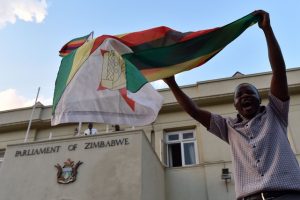The Attorney-General’s Office Amendment Bill
Introduction
This is an odd Bill, in that it will amend an Act of Parliament which was passed by Parliament nearly nine years ago but has never been brought into force. Some of the Bill’s provisions are even odder, as we shall show in this Bill Watch.
Background to the Bill
The Attorney-General’s Office Act
The Act to be amended by the Bill is the Attorney-General’s Office Act [link], which was gazetted as an Act on the 10th July 2011 but has never been brought into force. Section 1(2) of the Act requires the Act’s date of commencement to be fixed by the President by statutory instrument in the Government Gazette, but the President has never published such an instrument.
The Act dates from the time of the former Constitution, when the Attorney-General was not only chief Government legal adviser but also held exclusive and independent responsibility for prosecuting criminal proceedings in all courts. He [and all our Attorneys-General have been men] discharged these responsibilities with the assistance of one or more Deputy Attorneys-General and a large staff of civil servants serving in several divisions covering prosecutions, drafting legislation, representing Government in civil legal matters, giving legal advice and exercising certain statutory functions. The Attorney-General and his deputies, however, were not themselves members of the Public Service [now the Civil Service]. They were appointed and exercised their functions under section 76 of the old Constitution.
The Act was intended to transfer the whole of the then Attorney-General’s Office, including prosecutors, to a new entity outside the Public Service called “the Attorney-General’s Office” which would have its own Board and administration to provide administrative services previously provided by the Ministry of Justice, Legal and Parliamentary Affairs.
Deferral of commencement of the Act
Bringing the Act into effect was deferred, probably because it was envisaged that the new Constitution would separate the offices of Attorney-General and Prosecutor-General; possibly also because, as rumoured, the then Attorney-General Mr Tomana objected to not being chairman of his own Office’s Board. Whatever the reason, the deferral has lasted for nearly nine years and the Act is no longer consistent with the new [i.e. the present] Constitution.
The Present Constitutional Provisions on the Attorney-General
In terms of section 114 of the Constitution the Attorney-General is appointed by the President as the Government’s principal legal adviser with additional responsibility for representing the Government in non-criminal legal proceedings and drafting the Government’s legislation. Under section 115, he or she can be removed at any time by the President ‒ this follows from the fact that everyone, including the Government, must have the power to change their legal advisers whenever they want to. The Attorney-General can act through subordinate officers in terms of section 114(3) but, beyond saying that, the Constitution does not deal with the appointment of Deputy Attorneys-General nor with the establishment and structure of an Attorney-General’s Office.
Attorney-General and deputies are currently part of Civil Service
Surprising as it may seem to the current Attorney-General and his deputies, all of them are civil servants except for one deputy who was appointed under the old Constitution. This is because under section 199(2) of the Constitution the Civil Service consists of persons employed by the State excluding members of the security services, judicial officers, members of constitutional Commissions, the staff of Parliament and other persons whose offices or posts are stated by the Constitution or an Act of Parliament not to form part of the Civil Service. The Constitution does not exclude the Attorney-General and his deputies from the Civil Service, nor does any Act of Parliament ‒ at least until the Attorney-General’s Office Act is brought into operation. Until then they are civil servants and their conditions of service should, strictly speaking, be fixed by the Civil Service Commission under section 203 of the Constitution, rather than by the President.
In fact the conditions of service of the Attorney-General and his deputies have been fixed by the President, purportedly in terms of section 340(1)(e) of the Constitution which states that a power to appoint someone includes power to fix their conditions of service.
Need for the Bill
What we have said in the preceding two paragraphs illustrates one reason for the Bill. Another is that members of the Attorney-General’s staff probably feel the need for change. They are still members of the Civil Service, and have been left behind by their former colleagues and contemporaries who are now members of the National Prosecuting Authority. This has happened despite the fact that the original intention behind the Attorney-General’s Office Act was that all members of the office, not just members of the prosecutions division, should be separated from the Civil Service in the interests of impartiality and independence in the provision of all legal services to Government and the need to hire and retain staff of the right calibre. More generally, it is necessary to update the Act to bring it into line with the Constitution.
Analysis of the Bill
The Bill will go some way at least towards bringing the Attorney-General’s Office Act into line with the Constitution
Updated preamble
Clause 2 replaces the preamble to the Act with an extract from the present Constitution, replacing the existing extract from the former Constitution.
Appointment of Deputy Attorneys-General
As we pointed out earlier, although the former Constitution provided for the appointment of Deputy Attorneys-General, the present Constitution does not. Section 340(3) of the present Constitution, however, permits an Act of Parliament to provide for appointment of deputies to the holder of any constitutional office. Clause 4 of the Bill will accordingly insert a new section 2A into the principal Act to allow the President to appoint Deputy Attorneys-General after consultation with the Judicial Service Commission. They will not be civil servants, and the Government will not be allowed to reduce their salaries and allowances during their tenure of office.
Composition of the Attorney-General’s Office Board
Clause 6 amends section 4 of the principal Act to make the Attorney-General the chairperson of the Attorney-General’s Office Board, replacing the existing provision for the chairperson to be a former judge or senior lawyer from outside the Office. Deputy Attorneys-General will not be members of the Board.
Ministries not to employ lawyers without Attorney-General’s approval
Clause 7 of the Bill inserts a new section 11A prohibiting Government Ministries and departments from “engaging the services of a person under an employment contract to render any legal services relating to the functions of the Attorney-General’s Office without the approval of the Attorney-General”. Note that the clause only prevents Ministries from engaging lawyers as employees; it will not prevent them from engaging lawyers as consultants to provide legal advice, nor will it prevent Ministries from engaging lawyers to represent them in court ‒ because such lawyers are never engaged as employees.
Binding nature of Attorney-General’s opinions on questions of law
Clause 8 of the Bill inserts an extraordinary new section 22A in the Act which will state that opinions of the Attorney-General on questions of law are binding on the Executive unless overturned by a court of law. What this means is that the opinion of even the most junior member of the Attorney-General’s Office will bind the Government, including the President, even if the opinion is palpably wrong.
While this may have been the practice [to encourage Ministries to follow legal advice given to them by the Attorney-General] it is not always appropriate to convert a practice into law. Making the Attorney-General’s opinions and advice legally binding on the whole Government may turn out to be counter-productive:
- It may encourage those suing Government to add a new ground for their complaints: that the Minister or other official being sued went against the Attorney-General’s legal opinion in contravention of an Act of Parliament [although such opinions are meant to be confidential, it is notorious that nothing remains confidential in Zimbabwe for long].
- It will lead to the anomaly that if a Permanent Secretary declines to follow an incorrect opinion given to him by the Attorney-General’s Office, he or she will be breaking the law [i.e. the new section 22A] while at the same time complying with the law as it really is.
- It may give rise to pointless disputes within the Government over whether an opinion was on a question of law, or a question of fact, or question of mixed law and fact.
We recommend that when the Second Reading debate resumes MPs should press the Minister to rethink this clause.
Law officers in Ministries to become members of Attorney-General’s Office on secondment
Clause 9 of the Bill is very obscure. It provides that every “law officer” [i.e. a civil servant employed in a Ministry to do legal work] is “deemed to be seconded” to that Ministry “until reassigned by the Attorney-General”. The Attorney-General cannot reassign civil servants ‒ that is the function of the Civil Service Commission. Perhaps the clause was supposed to mean that the law officers are to be taken out of the Civil Service and transformed, without any option, into members of the Attorney-General’s Office. If that was the intention, the clause does not say so; in any event, it may well be unconstitutional to transfer people out of the Civil Service and into another service without their consent.
Commencement of the Bill
The Bill does not have a delayed date of commencement so it will come into effect as law immediately it is published in the Gazette as an Act, and the amendments it makes will thereupon be incorporated into the Attorney-General’s Office Act. That Act, however, is not yet in operation so the amendments will not take effect until the President has published a notice in the Gazette bringing the Act into operation.
As we pointed out at the beginning of this bulletin, it is odd to amend an Act which has not yet come into operation, but it is legally permissible to do so.
General comments on the Bill
The Bill has not been carefully checked. Typos and incorrect punctuation and omissions of capital letters abound. It is disappointing that the Attorney-General’s Office allowed a document with so many minor flaws to be sent to Parliament and gazetted. This lack of attention to detail prompts one to wonder whether the principal Act has been carefully read through from beginning to end to check whether the passage of nine years has necessitated any updating not covered by the Bill. We have found a couple of instances:
- Section 4(2), which states that the minimum number of women on the Attorney-General’s Office Board must be “at least three or four” needs to be clarified.
- references to the “Comptroller and Auditor-General” in section 21 need to be updated – the title is now Auditor General.
- the date “31st December 2010” in section 27(6) needs correcting.
More importantly for the Attorney-General himself, a provision should be inserted stating that his salary and allowances cannot be reduced while he holds office [the Bill contains such a provision for the Deputy Attorneys-General but nothing is said about the Attorney-General].
Status of the Bill
The Bill was gazetted on the 21st February and was referred to the Parliamentary Legal Committee [PLC] immediately after its First Reading in the National Assembly on the 18th March, the day Parliament adjourned to comply with measures against the COVID-19 pandemic. It has had a non-adverse report from the Parliamentary Legal Committee, but because of COVID-19 there have been no public hearings.
Veritas makes every effort to ensure reliable information, but cannot take legal responsibility for information supplied.
Post published in: Featured














 Kathryn Rubino is a Senior Editor at Above the Law, and host of
Kathryn Rubino is a Senior Editor at Above the Law, and host of 



